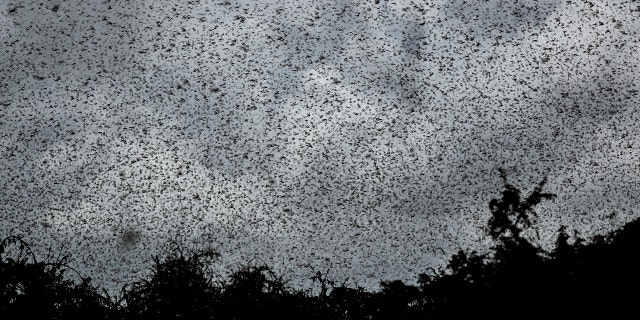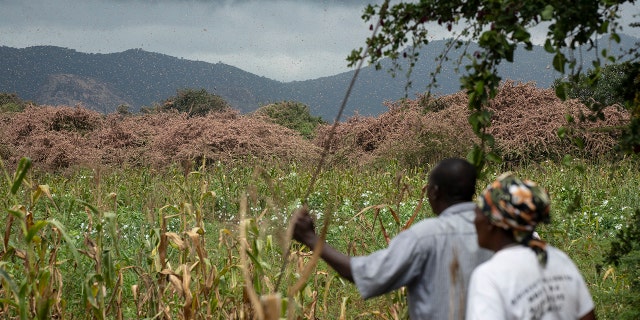Hundreds of millions of locusts have swarmed Kenya in the worst infestation to hit the East African nation in 70 years, devouring vital farmland in a region already suffering from extreme hunger.
The plague of desert locusts swarmed into Kenya from neighboring Ethiopia and Somalia, where an outbreak on this level has not been seen in a quarter century.
“Even cows are wondering what is happening," said Ndunda Makanga, who spent hours Friday trying to chase the locusts from his farm. "Corn, sorghum, cowpeas, they have eaten everything.”

Kenyan media showed farmers clanging pots and pans as police shot bullets and tear gas at a swarm of insects to try to scare the voracious insects away from their crops, according to Reuters.
The locusts have overrun about 172,973 acres (70,000 hectares) of land in Kenya, devouring crops and destroying farmland as citizens face high levels of food insecurity. One swarm in the northeast measured 37 miles long by 25 miles wide (60 kilometers by 40 kilometers).

A single swarm can contain up to 150 million locusts per square kilometer of farmland, an area the size of almost 250 football fields, regional authorities said. A small swarm can consume enough food for 35,000 people in a single day, said Jens Laerke of the U.N. humanitarian office in Geneva.
In Ethiopia, farmer Ahmed Ibrahim swung empty water jugs at a swarm feasting on his crop of khat, a mildly narcotic leaf, and described his plight to Reuters.
“We have nothing else to sell at the market. How will I feed my eight children?” he asked
The insects are now heading toward Uganda, where such an outbreak has not happened since the 1960s, and South Sudan, where almost half the country faces hunger as it emerges from civil war.
The locusts also are moving steadily toward Ethiopia’s Rift Valley, the breadbasket for Africa’s second most populous country, the U.N. said.
A Plague Of “Billions” Of Locusts Threatens To Create A Horrific End Times Famine All Over Africa
Billions of locusts are eating everything in sight in east Africa right now, and every single day many more farms are being completely wiped out. Unfortunately, authorities are telling us that what we have seen so far is just the tip of the iceberg. In fact, if extreme measures are not implemented immediately, authorities are claiming that this locust plague could literally get “500 times” worse in a few months. But it is difficult to imagine conditions getting any worse than they are at this moment. Ravenous locust swarms that are “the size of cities”are consuming crops at a staggering pace, and this could potentially cause famine on the African continent that is unlike anything we have ever seen before.
It can be difficult to imagine a plague of “billions” of locusts. After all, there are only about 7 billion people living on the entire planet.
But this is actually happening. Right now “billions of locusts” are absolutely devastating east Africa, and each one can eat “its own weight in food every day”…
It would be hard to overstate what this is going to mean for the region. According to the FAO, this plague is an “unprecedented threat to food security and livelihoods in the Horn of Africa”…
The United Nation’s Food and Agriculture Organisation has described the situation as “extremely alarming,” representing an “unprecedented threat to food security and livelihoods in the Horn of Africa.”
We have seen starvation in Africa before. In fact, there was a time when our airwaves were filled with images of starving African children.
But if this plague continues to get even worse, the stage is being set for a famine that is far greater than anything that any of us have ever witnessed.
No comments:
Post a Comment